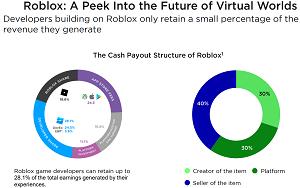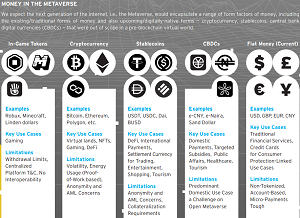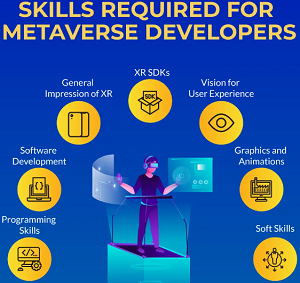In-Depth
The Metaverse Developer Pay Problem
The emerging metaverse hasn't quite coalesced into a "thing" yet, but everyone pretty much agrees it's going to shake things up across the board, including a lot of jobs.
That includes software developers, who are now deciding if they should venture into the world of 3D virtual worlds, augmented reality, cryptocurrency, NFTs, blockchains, a distributed internet, decentralized autonomous organizations and so on. In making that decision, they must weigh a lot of factors and ask a lot of questions. Can software developers make a lot of money in the metaverse? How much? How and with what will they be paid?
It's a brand-new ballgame, and these considerations are still shaking themselves out.
With the metaverse not yet well formed, good places to investigate these issues are early-adoption areas like gaming and NFT commerce, forerunners of the expected massive corporate presence initiatives that may see tech operations and business conducted largely online.
For example, Microsoft, in announcing its acquisition of game development company Activision Blizzard early this year, said, "This acquisition will accelerate the growth in Microsoft's gaming business across mobile, PC, console and cloud and will provide building blocks for the metaverse." In fact, none other than CEO/chairman Satya Nadella weighed in on the buyout and signaled its importance to more mainstream metaverse future.
"Gaming is the most dynamic and exciting category in entertainment across all platforms today and will play a key role in the development of metaverse platforms," Nadella, said. "We're investing deeply in world-class content, community and the cloud to usher in a new era of gaming that puts players and creators first and makes gaming safe, inclusive and accessible to all."
Metaverse Gaming Pioneers: 'Game Developers Can Be Key'
"Game developers can be key," says a recent article on the Finance Magnates" site. "In order to gain and keep users, there must be a hook, and no one is more adept at building environments that connect with the imagination and activate mental reward circuits than game developers who fully comprehend the mechanics of an addictive digital experience.
"For this reason, we should perhaps look to the games industry as a place from which compelling metaverse-type environments might emerge, appealing not only to a subsection of NFT and crypto enthusiasts but to the mainstream. What's more, the games industry has deep pockets, and can build through every market cycle, including so-called crypto winters."
With their early entry into the metaverse ecosystem, game developers are now experiencing new things that may well translate to future mainstream enterprise-oriented software development.
And one of the things they are experiencing is a pay problem.
A new trends report from Newzoo sheds light on the issue, which is actually widespread and not endemic to the metaverse. Newzoo uses gaming platforms, specifically Roblox, as an example in its report titled "The Metaverse, Blockchain Gaming, and NFTs: Navigating the Internet's Uncharted Waters."
Roblox is both an online gaming platform and game creation system, wherein developers can build games for others on the platform to use. Newzoo describes it as one of the most popular games on the planet and says it provides a peek into the future of virtual worlds. However, there's a catch for Roblox developers.
"Developers building on Roblox only retain a small percentage of the revenue they generate," the report said. "As opposed to traditional distribution platforms like Steam and Google Play, which feature a standard 30 percent cut on all game or in-app purchases for most developers, Roblox takes a much higher fee -- close to 75 percent -- from game developers building on its platform. This is substantial, even when compared to Meta announcing a 47.5 percent take rate for Horizon Worlds, a move that generated ample community backlash."
 [Click on image for larger view.] Roblox Cash Payout Structure (source: Newzoo and Roblox).
[Click on image for larger view.] Roblox Cash Payout Structure (source: Newzoo and Roblox).
Indeed, Meta (formerly Facebook) caused quite a stir for that April announcement that was reported by CNBC, which said the company "is planning to take a cut of up to 47.5 percent on the sale of digital assets on its virtual reality platform Horizon Worlds, which is an an integral part of the company's plan for creating a so-called 'metaverse.'"
Meta also stirred controversy with a virtual reality headset charging scheme, as reported by Financial Times. "Meta is facing a growing backlash for the charges imposed on apps created for its virtual reality headsets, as developers complain about the commercial terms set around futuristic devices that the company hopes will help create a multibillion-dollar consumer market," Financial Times reported.
Furthermore, "several developers told the Financial Times of their frustration that Meta, which is seen as having an early lead in a nascent market, has insisted on a charging model for its VR app store similar to what exists today on smartphones. This is despite Meta chief Mark Zuckerberg being strongly critical in the past of charging policies on existing mobile app stores."
While some developers have criticized the Roblox revenue/payment scheme, Newzoo points out that the nearly 75 percent skim from developers -- said to be higher than those found in many traditional digital storefronts -- can be explained by inherent advantages that developers enjoy when using the platform, such as a huge user base and the pre-existing game engine called Roblex Studio that developers can use for their creations.
Payment Methods
Besides payment schemes, another issue being worked out concerns payment methods. Meta, in discussing its Horizon Worlds monetization, said, "We're beginning to roll out a test with a handful of creators that will let them sell virtual items and effects within their worlds. For example, someone could make and sell attachable accessories for a fashion world or offer paid access to a new part of a world."
Unsurprisingly, cryptocurrency and NFTs have been identified as potential payment options in the metaverse, but that may not be popular among developers looking to get paid for their metaverse gaming efforts.
"Two of the hottest, and polarizing, topics being debated in the game industry are cryptocurrency and non-fungible tokens (NFTs)," says a recent post from the Game Developers Conference, discussing a developer survey. "While the majority of developers said that they and their studio are not interested in cryptocurrency (72 percent) as a payment tool or in NFTs (70 percent), for such a nascent space, 27 percent percent of developers are at least somewhat interested in cryptocurrency at their studio and 28 percent are at least somewhat interested in NFTs."
Developers may not have a payment choice, though, if the metaverse disrupts what we traditionally think of as "money."
 [Click on image for larger view.] Money in the Metaverse (source: Citi).
[Click on image for larger view.] Money in the Metaverse (source: Citi).
"The definition of what counts as money in the Open Metaverse is likely to be very different from what counts as money in the real world today," says financial powerhouse Citi in a paper titled "Metaverse and Money: Decrypting the Future." It says, "We expect different forms of cryptocurrency to dominate, given the inherent multi-chain trend in the crypto ecosystem, but to coexist with fiat currencies, CBDCs, and stablecoins."
Furthermore, Citi said: "For creators and builders, it is important that the Metaverse form of money is easily accessible, has predictable fees, and is convertible to real-world currencies of choice. We could foresee a future where streaming packets of money flow in the opposite direction to streaming content from decentralized Netflix-like apps. Also, depending on how we define embedded finance, nearly all payment in the Metaverse could be embedded finance payments."
Many see a future for tokenomics in the metaverse, including a role among developers. Tokenomics refers to many multiple aspects having to do with cryptocurrencies and tokens earned in game playing.
"The Open Metaverse parameters rely heavily on composability between traditional gaming, blockchain gaming, and crypto," decentralized finance adviser Ioana Surpateanu is quoted as saying in the Citi report. "I believe tokenomics could play a crucial and unifying role here as game developers are extremely familiar with in-game economies and do see the value of network effects and community coordination mechanisms enabled by crypto tokens."
However, some pundits don't have such a positive outlook on developer/cryptocurrency tokenomics concerns. For example, a Venture Beat article says: "Cryptocurrency has taken center stage in the emergence of the metaverse. Developers are announcing, and sometimes launching, metaverse spaces powered by a blockchain economy. These projects come pre-loaded with hype around the ownership creators are given, and how much potential there is for users to -- somehow -- gain great piles of cryptocurrency riches. But these are too often pay-to-win scenarios where developers are seemingly trying to wring out as much profit as possible from the communities they're creating. It makes the promise of a decentralized metaverse feel less like a future virtual utopia and more like yet another offshoot of late-stage capitalism."
The Citi report also discusses some friction between developers and the crypto camp.
"Moreover, I believe the collaboration between the traditional game developer community and the crypto community -- even though vital -- won't be frictionless," Surpateanu said. "The current Metaverse exuberance is largely a result of the exponential growth of blockchain-based gaming. However, traditional game developers opine there isn't much quality in the blockchain-based game sector today. The Open Metaverse parameters rely heavily on composability between traditional gaming, blockchain gaming, and crypto. I believe tokenomics could play a crucial and unifying role here as game developers are extremely familiar with in-game economies and do see the value of network effects and community coordination mechanisms enabled by crypto tokens."
The gaming/crypto divide is also addressed in an article by The Verge titled "Why gamers hate crypto, and music fans don't."
"Gamers and developers are engaged in a perennial battle over how games are monetized," the article says. "Gamers generally want to pay one low price to play a game forever; developers are forever experimenting with exotic new financing schemes to grow their profits. Outside of the play-to-earn gaming ecosystem, any game developer announcing some sort of NFT/crypto integration has faced massive backlash, leading some to disavow the project."
Does It Pay Now?
While developer pay and payment schemes are likely to mature and stabilize as the metaverse forms, what is the developer pay situation now? That is, apart from all of the above -- much of which pertains to small-shop development shops or individual contributors -- what are the enterprise salaries being offered, and skills being sought, and positions open? Here, it's quite the mixed bag.
As far as skills, 101 Blockchains sees a need for extended reality (XR) expertise along with traditional software development skills in the article "How To Become Metaverse Developer?"
 [Click on image for larger view.] Required Skills (source: 101 Blockchains).
[Click on image for larger view.] Required Skills (source: 101 Blockchains).
As far as salaries, a January article by The U.S. Sun says the aforementioned Roblox was offering $430,000 per year to be a metaverse worker.
TheMetaverseJobs.com, meanwhile, detailed "6 Jobs in The Metaverse That Pay $125,000+" in an article from last September (which, again, mentions Roblox).
For NFT gaming-specific developers, TechBullion published a March article on "How Much NFT Game Developers Earn?" Borrowing data from careers site ZipRecruiter, the article said, "The national average income for an NFT Game Developer is $101,644." The hourly rate, meanwhile, was pegged at $49 in the United States. "An NFT Game Developer's hourly wage normally ranges from $36.06 to $62.02 per hour," the article said. It also listed these data points:
- The average starting salary for an NFT Game Developer is $67,000.
- Oregon ($107,541), Washington ($106,339), Connecticut ($107,541), and California ($107,541) are the states with the highest salary for NFT Game Developers.
- San Francisco, CA ($113,091), Vancouver, WA, Hillsboro, OR, Las Vegas, NV, and New York, NY are the highest paid cities for NFT Game Developers.
- NFT Game Developers on the lower end of that spectrum, specifically the poorest 10 percent, earn around $67,000 per year, while the top 10 percent earn around $126,000.
- That year, the top 25 percent earned $108,000, while the bottom 25 percent earned $77,000.
- Internet, Manufacturing, and Hospitality are the industries with the highest NFT Game Developer incomes.
More info comes from HQ Hire, which pegged the average median salary of AR/VR software engineers at $76,250 per year (the salary range is $29,250 to $137,728, though, so take the info with a grain of salt). Requisite skills include:
- 3D modeling programs like Maya or Blender.
- Programming skills such as C++, Java, Python, Unity3d, Unreal Engine 4, etc.
- Good understanding of geometry and linear algebra.
Careers firm Hired also detailed AR/VR engineer salaries in its "2022 State of Software Engineers Report," which found that average salaries actually decreased from $170,977 in 2020 to $158,698 in 2021.
"With the rise of AR and VR and big tech companies determining how to enter the metaverse, keep an eye out for what's next in this space, too," Hired said. "Remember -- AR/VR engineers are also in high demand and get compelling salaries due to their specialty skill set."
Another place to look at metaverse-related salaries is at Meta itself. Careers firm Glassdoor said, "The typical Meta Developer salary is $99,953 per year. Developer salaries at Meta can range from $50,000 - $161,036 per year."
The general takeaway here is that metaverse development pays well and is likely to only increase as the metaverse takes shape. But, as noted, there are a lot of uncertainties about the developer payment situation to be decided in the future, especially for small shops or solo coders. Then, after all, many developers might be working for a metaverse company on metaverse projects from within the metaverse itself, earning metaverse money that they put in a metaverse bank that they spend in metaverse stores.
The meta future will be meta interesting.